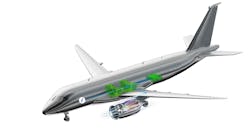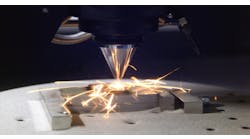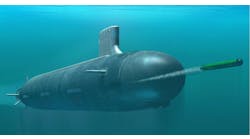Jet-engine builder Pratt & Whitney has joined a consortium of engine and propulsion technology companies to develop hybrid-electric and water-enhanced turbofan technology. P&W’s GTF™ geared-turbofan engine architecture will be the basis for testing a new-concept propulsion system combining Water-Enhanced Turbofan (WET) technology and hybrid-electric propulsion.
The Sustainable Water-Injecting Turbofan Comprising Hybrid Electrics (SWITCH) project aims to demonstrate technologies that will improve fuel efficiency by up to 25% over today’s standards, and reduce aircraft emissions, compared to current state-of-the-art propulsion systems for short- and medium-range aircraft.
“This project will enable us to advance several key technologies on our roadmap to further extend the efficiency of the GTF engine architecture,” according to Geoff Hunt, Pratt & Whitney senior vice president, Engineering and Technology.
The project’s first phase runs through 2025 and will include testing of a hybrid-electric GTF engine, WET technology, and sub-system laboratory testing, and design activity around an integrated hybrid-electric and WET cycle propulsion system. Subject to successful testing of these technologies and components, ground testing and flight tests are expected to follow.
The technologies developed will be compatible with clean alternative fuels – including sustainable aviation fuel (SAF) — and will be evaluated for future use with hydrogen fuel. “Given the challenge of reducing the environmental impact of aviation, cross-industry collaboration and public-private partnerships like Clean Aviation will play a vital role in delivering the technology breakthroughs needed to make net zero emissions aviation a reality,” Hunt added.
Other members of the SWITCH consortium are Airbus, Collins Aerospace, GKN Aerospace, and MTU Aero Engines AG. The project is coordinated by MTU, and supported by the EU Clean Aviation Joint Undertaking, an ongoing public-private research body.
Collins will provide megawatt-class electric motor generators and power electronics, high-voltage DC distribution and protection, thermal management components and nacelle architectures for the project.
GKN Aerospace will develop engine structures with new functions, such as integrated electric machines and heat exchangers.
“WET offers considerable potential to boost efficiency and reduce all emissions significantly for future aircraft propulsion systems, whether they are powered by conventional kerosene, SAF, or even hydrogen,” stated Dr. Stefan Weber, MTU senior vice president, Engineering and Technology.






